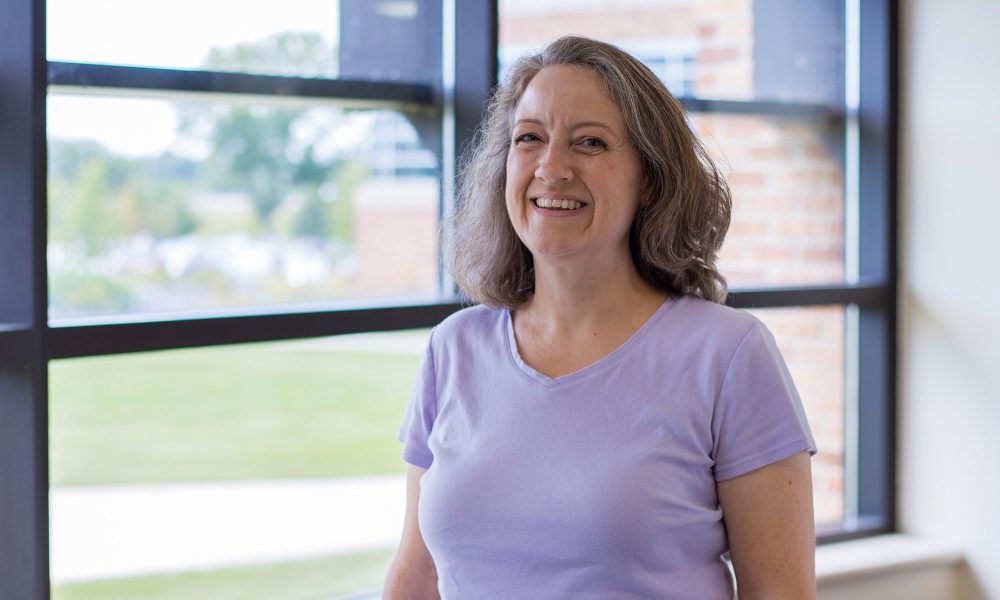
Dr. Alexa Doebele is an associate professor of music and Director of Choral Activities at Concordia University Wisconsin, where she conducts Kammerchor, Selah, and the Chapel Choir, in addition to teaching undergraduate and graduate courses in music education, conducting, and choral literature. She joined the CUW faculty in 2009, having taught previously at the University of Wyoming, the University of Colorado, and Front Range Community College.
Why did you choose Concordia?
I was specifically interested in finding a teaching position at a Lutheran university, and CUW hired me, so it all worked out!
What does an average day in your life look like?
It usually depends on the day. A large chunk of my time is typically spent either in rehearsal or preparing for rehearsal. In addition, I usually teach one other class that is not performance-based, and I’m usually working on various administrative tasks (such as planning Kammerchor’s annual spring tour).
What do you love most about Concordia?
I love the students. When I travel with Kammerchor, I often hear comments about how wonderful and how well-behaved they are. I know perfectly well that they are not perfect angels all the time, but I am very fortunate to work with such great and fun people, and I truly enjoy spending time with them.
What’s your education and career background? Where did you study? What did you do before Concordia?
In college, I double-majored in vocal performance and German at Washington University in St. Louis. Right out of college, I started a Master of Music Education degree at the University of Colorado – Boulder, where I focused on choral conducting and also completed the requirements for a K-12 teaching license. After that, I stayed in Colorado and taught music in various public schools for ten years. I then became interested in the idea of teaching at the collegiate level – specifically in training future teachers and conductors – so I returned to CU for a doctorate in choral conducting and literature. Immediately before I started teaching at Concordia, I was finishing my doctorate while teaching part-time at the University of Wyoming and working part-time as the Director of Music at a Lutheran church near Denver.
What are you most passionate about in your work here at Concordia?
I love music, I love teaching, and I love my students. The day that I am no longer passionate about those things is the day I need to hang it up.
What’s the one key lesson from your courses/work here at Concordia that you hope students take away from interacting with you and learning from you?
It’s really all about people. I teach music, but music is only the vehicle through which I teach people. If we can get out of our own individual headspaces and focus on others, everything else will fall into place. I find this to be true no matter where life and vocations lead you. Knowledge is important, too, but what good is that knowledge if you can’t treat others decently? “If I speak in the tongues of men and of angels, but have not love, I am a noisy gong or a clanging cymbal” (1 Cor 13:1).
What’s the most interesting thing about your field of study that the general public might not know?
Most people see only the finished product (i.e., the performance). What they don’t see is the process to get there and all the blood, sweat, and tears (sometimes metaphorical, sometimes literal) that go into that process. Even my students may not always be aware of the process that allows me to take them through their process. If it all looks easy, then that means we have done our jobs well, but that doesn’t mean that it was easy.
Lastly, why should students study your field/discipline?
You don’t have to be a professional musician to appreciate and perform music. CUW is great in that we not only offer music majors to those who are interested in becoming professional musicians, but we also offer lots of opportunities for avocational musicians who can carry over into avocational musical pursuits after graduation. We work hard, but we also have a lot of fun! Music allows us time to be creative, but music is also very analytical, so we musicians tend to be very well-rounded thinkers.
Why should students consider Concordia?
There are so many opportunities to explore various interests both through coursework and extracurriculars. Our core curriculum helps guide students through a lot of different perspectives and fields of study, and we have many academic majors and minors from which students may choose. There are also loads of activities outside the classroom—clubs, Campus Ministry, athletics, and yes, music—that students can pursue if they are interested.
Are you interested in a career in music? We offer a master of church music program with a few different concentrations from which you can choose. You can request more information on the program here.